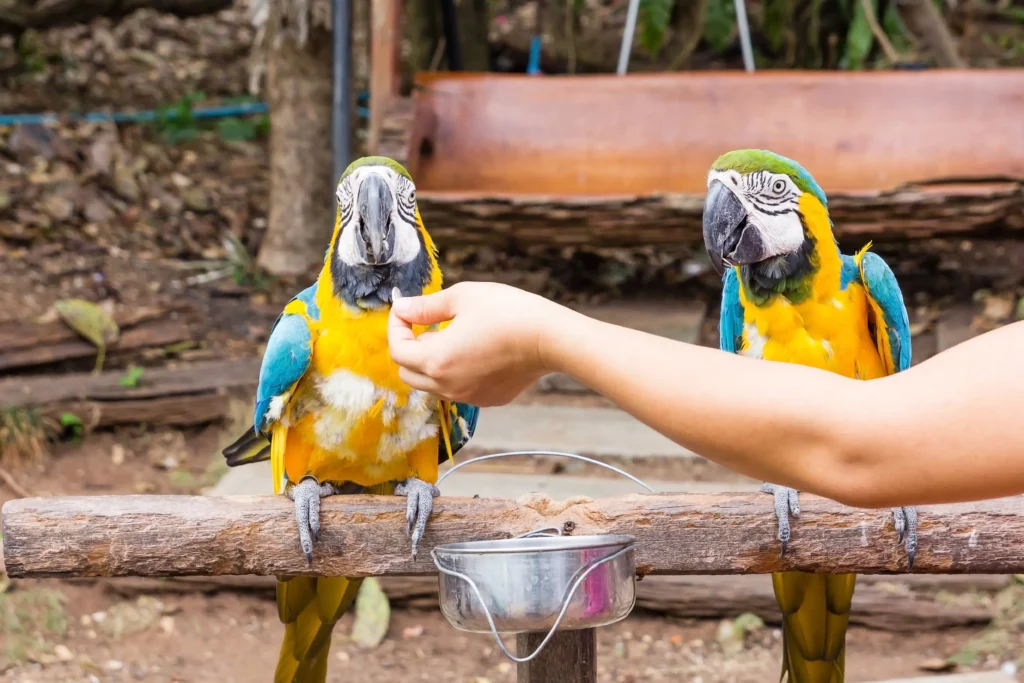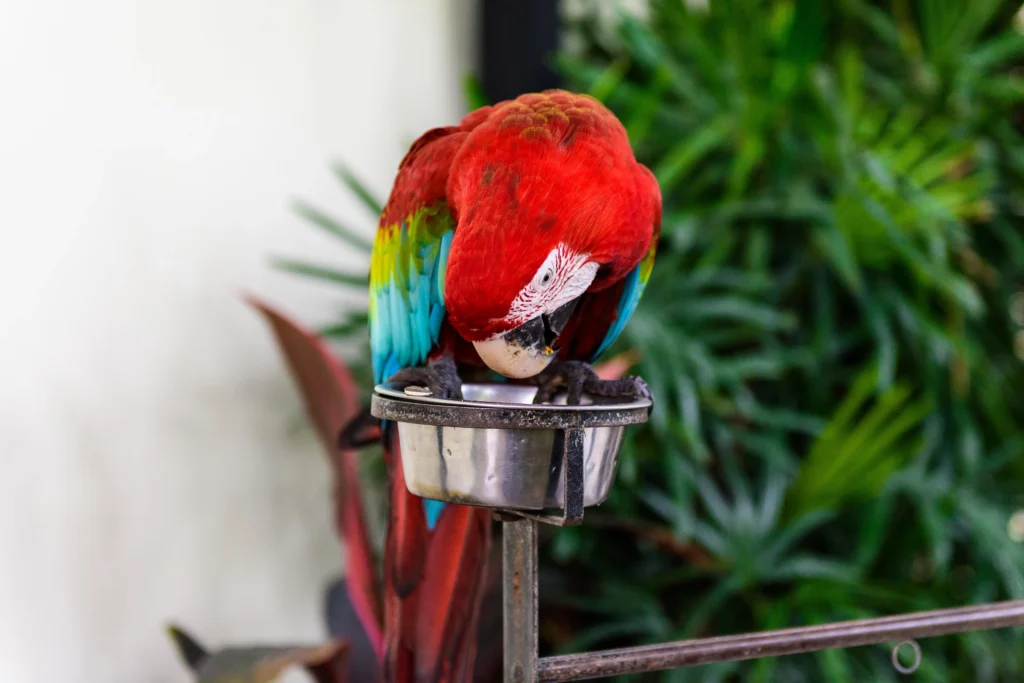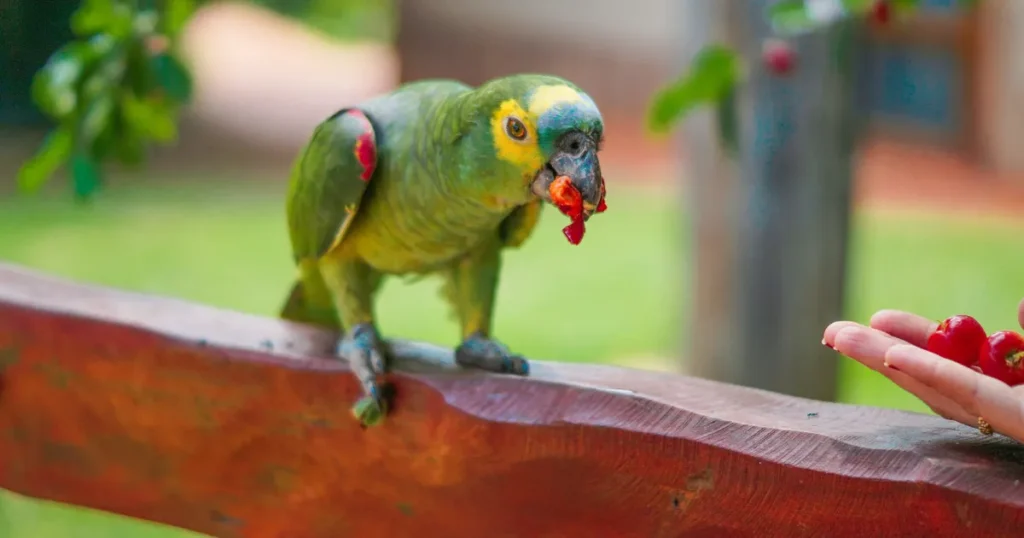Table of Contents
- Understanding Natural Macaw Feeding Patterns
- Daily Feeding Requirements for Pet Macaws
- Creating an Optimal Macaw Feeding Schedule
- Essential Nutrients Your Macaw Needs Daily
- How Often Do Macaws Eat: A Complete Guide
- Fresh Foods vs. Commercial Pellets: Finding the Right Balance
- Portion Control and Measuring Your Macaw’s Food
- Common Feeding Mistakes to Avoid
- Signs of Proper Nutrition in Macaws
- Special Dietary Considerations for Different Macaw Species
- Conclusion
- FAQ
How Often Do Macaws Eat?
Knowing when to feed your macaw is key to their health and happiness. Macaws are smart and colorful birds with special diet needs. They eat differently than other birds, so it’s important to understand their feeding habits.
Your macaw’s diet is vital for their well-being. A good diet plan gives them the nutrients they need. It helps keep their feathers bright, their minds sharp, and their immune system strong.
This guide will help you learn about feeding your macaw. We’ll cover their natural eating habits, daily needs, and tips for a balanced diet. This will ensure your macaw stays healthy and happy.
Key Takeaways
- Macaws require a specialized diet tailored to their unique nutritional needs
- Feeding frequency varies based on age, species, and activity level
- Balanced nutrition is critical for macaw health and longevity
- Wild feeding patterns differ significantly from pet macaw diets
- Regular monitoring of diet and weight is essential for optimal health
Understanding Natural Macaw Feeding Patterns
Macaws are fascinating birds with unique feeding behaviors. They show incredible adaptability in the wild. These colorful parrots have developed sophisticated foraging strategies. This ensures their survival across diverse tropical ecosystems.
Exploring what macaws eat in the wild reveals a diverse and complex diet. These intelligent birds primarily consume a variety of natural food sources. These food sources change with seasonal availability.
Wild Macaw Foraging Behaviors
Macaws are expert foragers with remarkable skills in finding food. Their diet typically includes:
- Tropical fruits like wild figs and berries
- Nuts from palm trees
- Seeds from various vegetation
- Flower nectar
- Occasional insects
Natural Feeding Times in the Wild
Macaw feeding times are closely linked to their natural habitat’s rhythm. They are most active in food gathering during early morning and late afternoon hours. This is when temperatures are cooler and food sources are abundant.
Seasonal Diet Variations
Macaw food requirements shift dramatically with seasonal changes. During wet seasons, they have access to more fruits and seeds. While dry seasons require more strategic foraging and dietary adaptations.
Their ability to crack open hard nuts and seeds with powerful beaks demonstrates their remarkable survival skills in challenging environments.
Daily Feeding Requirements for Pet Macaws
Knowing how much macaws eat daily is key to their health and happiness. The amount they need depends on their age, size, and how active they are. A balanced diet is vital for these smart birds to do well in captivity.
The best diet for macaws includes a mix of different foods. Here’s what they need daily:
- Pellets: 60-70% of daily diet
- Fresh fruits and vegetables: 20-30% of daily intake
- Seeds and nuts: 10% of diet (limited quantities)
Most large macaws need about 1/2 to 3/4 cup of pellets every day. Offer fresh foods in small amounts to avoid waste and ensure they get the nutrients they need.
Nutrition is key: A well-balanced diet supports your macaw’s immune system, feather health, and overall well-being.
Younger and more active macaws might need a bit more food. Older or less active birds should have their food measured carefully to avoid obesity. Always talk to an avian vet to make a feeding plan that fits your macaw’s needs.
- Provide fresh water daily
- Remove uneaten fresh foods after 2-3 hours
- Monitor your macaw’s weight and adjust portions accordingly
Creating an Optimal Macaw Feeding Schedule
Creating a consistent macaw feeding schedule is key for their health and happiness. A well-planned meal routine supports their nutritional needs and keeps them well. Knowing how often to feed pet macaws can greatly improve their life quality.
Pet macaws love predictability. Their meal frequency should match their natural eating habits but also fit domestic life. The goal is to find a balance that meets their dietary needs.
Morning Feeding Routine
Begin your macaw’s day with a nutritious breakfast. The morning meal should include:
- Fresh fruits (40% of meal)
- High-quality pellets (40% of meal)
- Small portion of vegetables (20% of meal)
“A good morning meal sets the tone for your macaw’s entire day” – Avian Nutrition Experts
Afternoon Snack Times
Mid-day snacks help keep your macaw’s energy up. Light snacks can be:
- Nuts in small quantities
- Seed mix
- Additional fresh vegetables
Evening Meal Guidelines
The evening meal should be similar to breakfast but with some changes. Aim for a balanced diet that winds down their daily nutrition. Cut down on protein and increase vegetables in this meal.
By sticking to a structured macaw feeding schedule, you’ll make sure your feathered friend gets the best nutrition all day.

Essential Nutrients Your Macaw Needs Daily
Knowing what your macaw needs is key to their health. A balanced diet keeps them vibrant and full of energy. The right diet should match their natural eating habits.
Macaws need a variety of nutrients to stay healthy. Their daily diet should include:
- High-quality protein sources
- Essential vitamins and minerals
- Healthy fats
- Complex carbohydrates
Protein is vital for muscle and feather health. Wild macaws eat a lot of protein-rich foods. You can give your bird similar foods. Make sure their fruit and vegetable diet is colorful and full of nutrients.
Here are some important nutrients for your macaw:
- Vitamin A: Helps with vision and immune function
- Calcium: Important for bones and feathers
- Omega-3 fatty acids: Good for brain and heart
- Vitamin E: Supports cell health
“A varied diet is the key to optimal macaw nutrition” – Avian Nutrition Experts
Commercial pellets are a good base for your macaw’s diet. But, add fresh fruits and veggies for a complete diet. Try to make their diet as varied as what they would eat in the wild.
How Often Do Macaws Eat: A Complete Guide
Knowing how often to feed your macaw is key to their health and happiness. Macaws need different foods at different times in their lives. So, it’s important to create a feeding plan that fits their needs.
How often to feed macaws depends on several important factors. The right schedule can greatly affect their health and energy.
Age-Based Feeding Frequencies
Feeding habits change a lot as macaws grow:
- Baby Macaws (0-6 months): Need to eat often, 4-5 times a day
- Juvenile Macaws (6-12 months): Eat 3 meals a day
- Adult Macaws (1+ years): Usually eat 2-3 meals a day
Activity Level Considerations
The best feeding plan for macaws depends on their activity level. Active birds might need more frequent, smaller meals. Less active ones should get balanced meals to avoid getting too fat.
- Highly active macaws: 3 meals with healthy snacks
- Less active macaws: 2 balanced meals, few treats
Health Status Impact on Feeding
A macaw’s health affects how often they eat. If they’re sick or recovering, you might need to change their eating schedule. Always check with an avian vet for advice.
Keep an eye on your macaw’s weight and energy to make sure they’re eating right.
By understanding macaws’ eating habits and tailoring their diet, you can keep them healthy and full of energy.
Fresh Foods vs. Commercial Pellets: Finding the Right Balance
Choosing the best diet for macaws is a big decision. You need to think about both fresh foods and commercial pellets. A balanced diet is crucial for your macaw’s health.
Experts say a mix of both is best. Pellets give a steady nutritional base. Fresh foods add variety and extra nutrients.
- Pellets should make up 60-70% of your macaw’s diet
- Fresh foods should be 30-40% of daily nutrition
- Change up fresh food options to get all nutrients
Knowing how to feed a macaw right means understanding each food’s benefits. Pellets have balanced vitamins and minerals. Fresh fruits and veggies add antioxidants and fiber.
| Food Type | Key Benefits | Recommended Percentage |
| Commercial Pellets | Consistent nutrition, balanced minerals | 60-70% |
| Fresh Vegetables | Antioxidants, fiber, natural enzymes | 20-25% |
| Fresh Fruits | Natural sugars, vitamins | 10-15% |
Start with small amounts of new foods and watch your macaw’s reaction. Every bird is different, with its own likes and needs.
Portion Control and Measuring Your Macaw’s Food
It’s important to manage your macaw’s food intake to keep them healthy. Knowing how much they eat daily is key. This involves controlling portions and measuring food accurately.
First, understand your macaw’s dietary needs. The amount of food they need changes based on their age, weight, and how active they are.
Weight-Based Portion Guidelines
When deciding how much food to give your macaw, use their weight as a guide. Here are some tips:
- Small macaws (under 1 lb): 1/4 to 1/3 cup of food per day
- Medium macaws (1-2 lbs): 1/2 to 2/3 cup of food per day
- Large macaws (over 2 lbs): 3/4 to 1 cup of food per day
Food Measurement Tools
Getting the right amount of food is crucial. Can macaws eat too much food? Yes, they can! Here are some tools to help:
- Digital kitchen scale
- Measuring cups with clear markings
- Portion control feeders designed for birds
Avoiding Overfeeding
“Prevention is better than cure when it comes to your macaw’s diet.” – Avian Nutrition Expert
Feeding too much can harm your macaw’s health. Look out for these signs:
- Excessive weight gain
- Reduced activity levels
- Difficulty moving or flying
Get advice from an avian vet to make a feeding plan that fits your macaw’s needs.
Common Feeding Mistakes to Avoid
Feeding a macaw needs careful attention and knowledge. Many pet owners make mistakes that harm their bird’s health. Knowing common diet mistakes helps you feed your bird right.
Here are key mistakes to avoid when feeding a macaw:
- Overreliance on seed-only diets
- Inconsistent feeding schedules
- Neglecting fresh food variety
- Improper food storage
- Ignoring portion control
What happens if a macaw eats too little? It can lead to serious health issues, including:
- Weakened immune system
- Reduced muscle mass
- Diminished energy levels
- Potential developmental problems
“Nutrition is the foundation of your macaw’s long-term health and happiness.” – Avian Nutrition Expert
Understanding nutritional balance is crucial. Your macaw needs a varied diet with fruits, veggies, and quality pellets.
| Dietary Mistake | Potential Consequences |
| Seed-only diet | Nutritional deficiencies |
| Inconsistent feeding | Metabolic disruptions |
| Overfeeding | Obesity and related health issues |
Consistent, balanced nutrition is key to your macaw’s vibrant health and longevity.

Signs of Proper Nutrition in Macaws
Keeping an eye on your macaw’s diet is key to their health. A balanced diet keeps them lively and full of energy. Knowing the signs of good nutrition helps you feed them right.
Watching your macaw’s health means looking at physical and behavioral signs. These signs show if their diet is balanced.
Physical Health Indicators
Look for these signs of good nutrition in your macaw:
- Bright, smooth, and glossy feathers
- Clear, alert eyes
- Strong, smooth beak without discoloration
- Healthy skin and clean, well-maintained plumage
- Consistent body weight
Behavioral Signs of Good Nutrition
Your macaw’s behavior can tell you a lot about their diet. Watch for these good signs:
- High energy levels
- Regular, consistent appetite
- Active and playful demeanor
- Clear, strong vocalization
- Regular sleep patterns
A detailed macaw food chart helps track these important signs. Regular checks ensure your macaw stays healthy with the right diet.
| Nutrition Indicator | Positive Sign | Potential Concern |
| Feather Condition | Glossy, vibrant | Dull, broken feathers |
| Energy Levels | Active, playful | Lethargy, reduced movement |
| Appetite | Consistent eating | Sudden changes in diet |
Remember, each macaw is unique. Regular vet visits help you keep track of their nutrition.
Special Dietary Considerations for Different Macaw Species
Not all macaws need the same food. Knowing what each species needs is key. Each macaw type has its own food likes and dislikes that affect their health.
Blue and Gold Macaws, with their bright colors, need a special diet. Their food should include:
- High-quality protein sources
- Varied fruit and vegetable diet
- Balanced calcium intake
- Minimal sunflower seed consumption
Scarlet Macaws have different food needs. They do well on a mix of fruits, veggies, and nuts. Their diet should include:
- Tropical fruits like papaya and mango
- Dark leafy greens
- Nuts for essential fatty acids
- Low-fat pellets
Hyacinth Macaws, the biggest parrots, need a special diet too. They need more fat and certain nuts to stay big and full of energy.
“Nutrition is the foundation of avian health, and each macaw species requires a tailored dietary strategy.” – Avian Nutrition Experts
Your macaw’s health, age, and how active they are will shape their food needs. Talking to an avian vet can help make the best diet plan for your macaw.
Conclusion
Knowing how often macaws eat is key to their health and happiness. A good feeding schedule gives them the nutrients they need. Learning how to feed a macaw right can greatly improve their life.
Every macaw is different, needing a diet that fits their specific needs. By following the tips in this article, you can make a balanced diet for your bird. It’s important to be consistent, varied, and careful with their food.
Your effort to learn about macaw nutrition makes feeding a chance to bond and care for your bird. Keep an eye on their health, adjust their food, and stay up-to-date on their diet. This will help you give them the best care.
Start your journey to becoming a great macaw caregiver. With patience, research, and love, you’ll find a way to feed your macaw that makes them happy and healthy. This will bring joy to both of your lives.
FAQ
How many times a day should I feed my pet macaw?
Feed your macaw twice a day, in the morning and evening. Each meal should have a mix of fresh fruits, veggies, and quality pellets. The amount depends on the bird’s size and type, usually 1/2 to 3/4 cup per meal.
What are the most important foods for a macaw’s diet?
A good diet for macaws includes 70-80% pellets, with fresh fruits and veggies as supplements. Include leafy greens, colorful veggies, berries, and a little bit of nuts. But avoid seeds as they’re too fatty and lack nutrients.
Can macaws eat human food?
Some human foods are okay for macaws in small amounts, but many are not. Safe treats include cooked lean meats, eggs, and some fruits and veggies. But stay away from chocolate, avocado, caffeine, alcohol, and processed foods as they’re toxic.
How much water should a macaw drink daily?
Macaws need about 10% of their body weight in water daily. Make sure to change their water twice a day. The exact amount depends on their diet, activity level, and the environment’s temperature.
How do I know if my macaw is getting enough nutrition?
Look for signs like bright feathers, clear eyes, and lots of energy. A healthy beak, nails, and stable weight are also good signs. Regular vet visits can also confirm if your macaw is getting the right nutrients.
What foods are toxic to macaws?
Foods like avocado, chocolate, caffeine, alcohol, onions, garlic, and processed foods with high salt or sugar are very dangerous. Always check with an avian vet about what’s safe and what’s not.
How often should I change my macaw’s diet?
Introduce new foods slowly, over 2-3 weeks. Macaws can be finicky, so be patient. Keep their diet varied with different fruits and veggies, but always have quality pellets as a base.
Do macaw dietary needs change with age?
Yes, as macaws grow, their nutritional needs change. Young ones need more protein, while older birds need fewer calories but more focused nutrition. Always consult with an avian vet to adjust their diet as they age.
